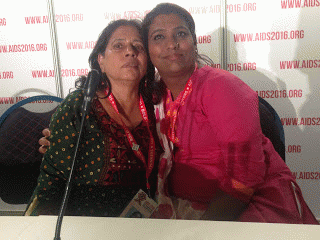
Shobha Shukla CNS Editor (left) and Amruta Soni transgender leader (right)
(Image by CNS (Citizen News Service)) Details DMCA
(CNS): Armed with a management degree in marketing, Amruta Soni is currently working in Patna as the state programme manager at National Coalition of PLHIV in India (NCPI) for the Vihaan project in Bihar. Today she confidently handles 15 partner NGOs, providing them with technical support on how to implement the programme and link people living with HIV (PLHIV) with Vihaan care and support centres.
But the torturous path to her present enviable status has been drenched with tears and sweats; sexual abuse and violence.
Forced to fend for herself from the tender age of 16, Amruta has battled daunting odds to give herself an education and a life of dignity, while facing the double jeopardy of being a transgender as well as a PLHIV. Exuding infectious confidence and brimming with vitality, Amruta did not mince any words while narrating to me the downs and ups of her life when I met her recently during the 21st International AIDS conference held in Durban in July 2016.
Amruta spoke with CNS (Citizen News Service) and shared her story of courage, steely resolve and determination to overcome challenges -- one after another -- and bring a difference in lives of transgender and women in our community. Here is Amruta's story in her own words:
Early life and struggles
"The youngest of three siblings, I was born in a Roman Catholic family of Solapur in Maharashtra. At the age of 16 when I had just passed Class 10, I was raped by my uncle. But the entire blame was put on me. My father asked me to leave the house - he said you cannot stay in the house as you are a transgender. So I was forced to move out with no economic support whatsoever. I got castrated and had my sex change surgery done to live with the Jogatha community. I am the first castrated Jogathi in the community to come out as a hijra (transgender) and live in society. As a Jogathi I was identified as God's lady. I was taught the art of helping with various temple chores - performing the aarti and worshipping the gods - and in return take whatever alms the people gave. Still shopkeepers would catch my hand and pull me inside offering me 5 rupees for having sex with them. But those measly 5 rupees were important for me at that time to keep me alive. Simply sitting at the temple was not getting me any money.
After sometime I felt the need to move on. I wanted to study and prove my worth as a human being. My mother, who has been my inspiration, thought that if I made something of myself, my family would accept me. A friend motivated me to complete Class 12 from Indira Gandhi National Open University (IGNOU). Then I did my graduation from Jamia Millia Islamia College in Delhi. I stayed outside Okhla hospital in Delhi. I would fill over 10-20 buckets of water every morning for a tea-stall owner just for one cup of tea in return. I would sleep on a hospital bench at night. I often disguised my identity and dressed like a man to stay safe. Under such trying conditions I completed my education. Later I did MBA in marketing from Symbiosis Institute. HIV was given as a gift to me by society. I had no employment and no one else to take care of my shelter, food, and education. So I had no option but to do sex work. During this period, I contracted HIV, which was diagnosed in 2012 when I was once taken to the hospital as a rape survivor. Even though I did not have the courage at that time to reveal my positive status, I stopped doing sex work as soon as my positive status was confirmed. I got myself registered at an ART centre in Maharashtra, despite the counsellor advising me not to do so, saying that I would not live beyond 6 months. But I persisted and here I am today.
Stigma and transphobia
(Note: You can view every article as one long page if you sign up as an Advocate Member, or higher).





